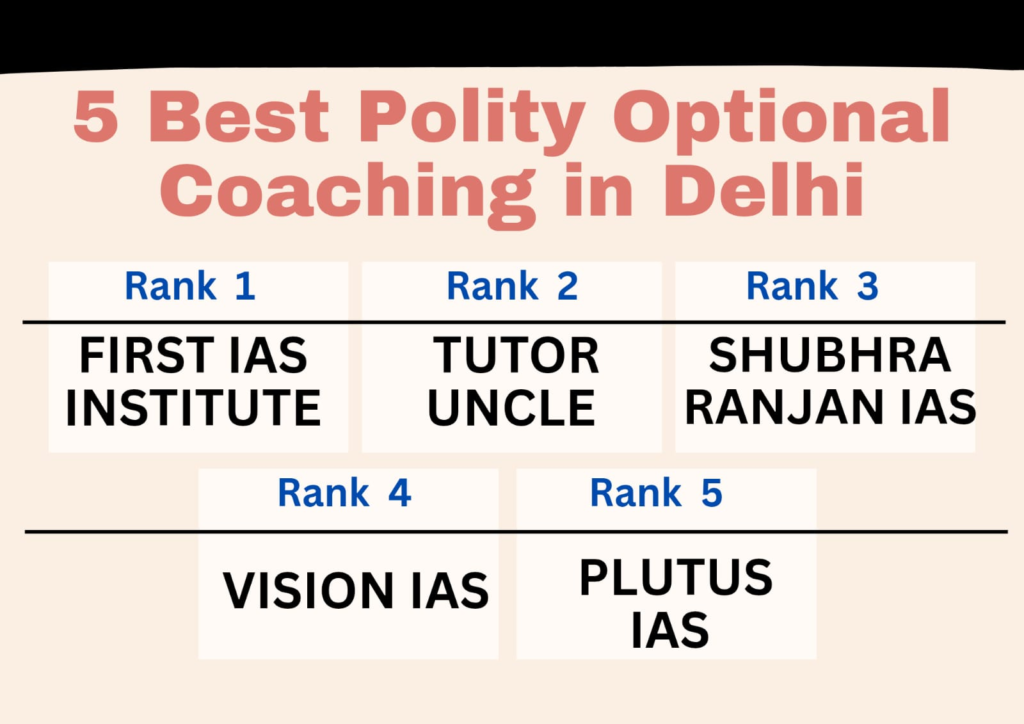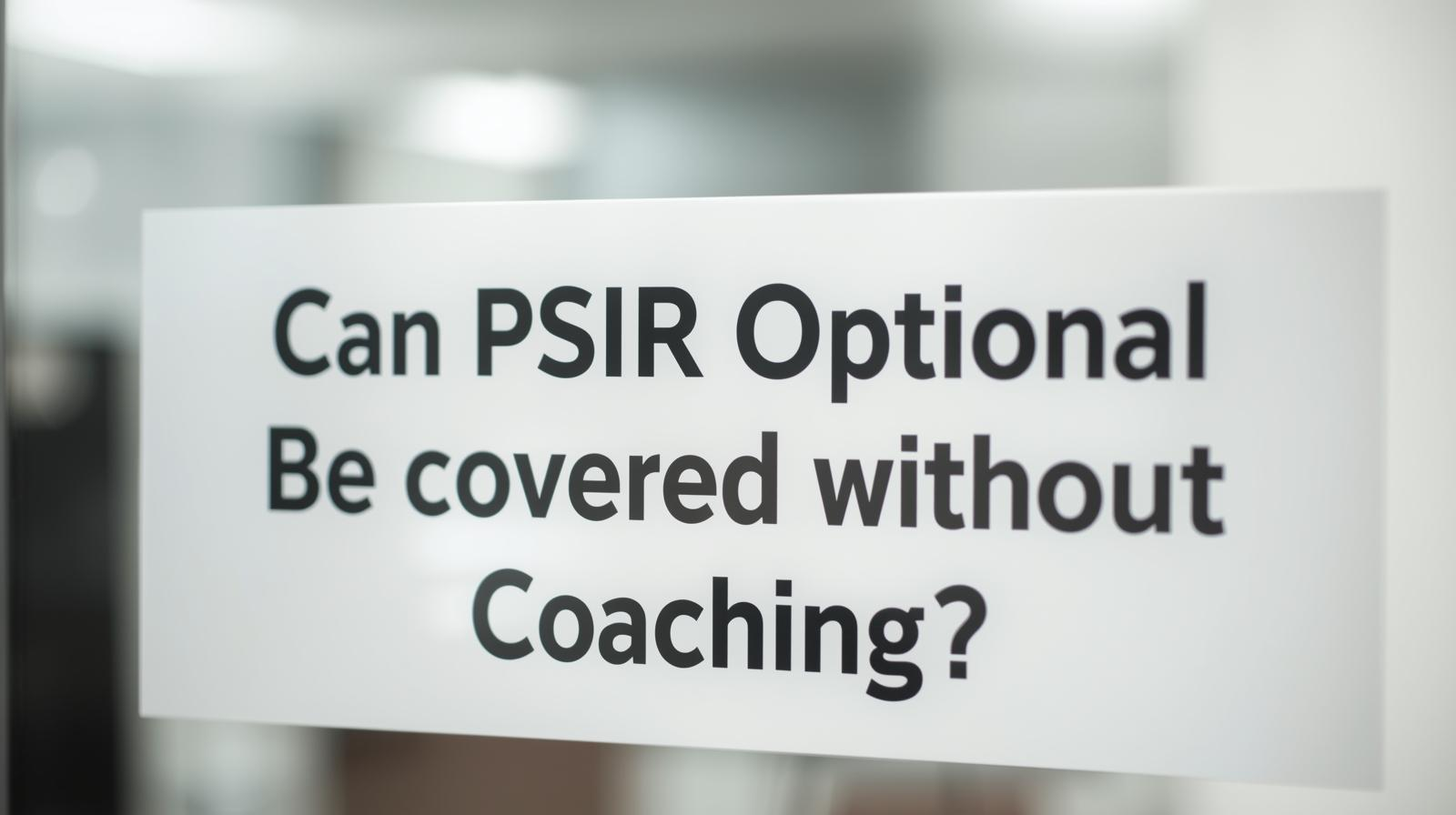The decision to opt for coaching or embark on a journey of self-study is one of the most critical junctures in a UPSC aspirant’s preparation. For an optional subject as vast and nuanced as Political Science and International Relations (PSIR), this choice carries even greater weight. The internet is filled with success stories, and the allure of self-preparation—promising flexibility and cost-effectiveness—is strong. However, a pragmatic and unvarnished assessment reveals that for the vast majority of serious candidates, navigating the complexities of PSIR without expert guidance is not just difficult; it is a strategic gamble against overwhelming odds.
This article aims to provide a realistic perspective on the challenges inherent in the self-study of PSIR. It argues that while theoretically possible for a select few with unique advantages, for most aspirants, structured coaching is an indispensable tool for converting knowledge into a high score.
Free Demo Class for PSIR Optional By – FIRST IAS INSTITUTE
The Misleading Allure of Self-Preparation
Before delving into the challenges, it is important to understand why self-study appears so attractive. Aspirants often point to the financial costs of coaching, the desire for a flexible study schedule, and the testimonials of a handful of toppers who claim to have prepared on their own. These factors are valid considerations. However, they often obscure the hidden costs and strategic disadvantages of an unguided approach, particularly in a subject as demanding as PSIR.
The belief that one can simply gather books, read online sources, and master the subject overlooks the fundamental nature of the UPSC examination. The exam is not a test of raw knowledge but of applied analytical skill. It is here, in the gap between knowing a fact and applying it effectively in a time-bound, competitive environment, that the true value of mentorship becomes apparent.
The Unseen Complexities of the PSIR Syllabus
A cursory glance at the PSIR syllabus can be deceptive. It appears as a structured list of topics. However, behind each line item lies a world of depth, debate, and dynamic change that standard textbooks alone cannot capture.
The Challenge of Abstraction in Political Theory (Paper 1A)
This section, dealing with Western and Indian political thought, is the bedrock of the entire optional. However, it is also the most abstract. Thinkers like Plato, Aristotle, Hobbes, Hegel, Gramsci, and Hannah Arendt did not write for UPSC aspirants. Their works are dense, philosophical treatises that are often misinterpreted without expert clarification.
A self-studying candidate faces several hurdles here:
- Understanding Nuance: Differentiating between Hegel’s ‘State’ and the modern concept of a nation-state, or grasping Gramsci’s subtle concept of ‘Hegemony’, requires more than a surface-level reading. A good teacher acts as a translator, demystifying these complex ideas and making them relevant to the exam.
- Interlinking Thinkers: High-scoring answers require you to compare and contrast thinkers. Understanding how Locke’s ideas are a response to Hobbes, or how Rawls’s theory dialogues with that of Nozick, is a complex task. A coaching environment fosters this comparative understanding through structured lectures and discussions.
The Dynamic Nature of Modern Politics (Paper 1B & Paper 2)
While Paper 1A is static, the rest of the syllabus is in constant flux. Indian Government and Politics (1B), Comparative Politics (2A), and India and the World (2B) are deeply intertwined with current affairs.
The problem for the self-studier is twofold:
- Information Overload: The daily deluge of news from sources like The Hindu, Indian Express, and various international journals is overwhelming. It is nearly impossible for an individual to filter, analyze, and link every relevant event to the static syllabus.
- Lack of Analytical Frameworks: Knowing about an event (e.g., a recent QUAD summit) is not enough. You must be able to analyze it through a theoretical lens (e.g., Realism, Liberalism, or Constructivism). Coaching institutions specialize in this synthesis, providing curated monthly magazines and special lectures that connect current events to the core syllabus, saving the aspirant hundreds of hours of work.
Also Read: 5 Best Polity Optional Coaching in Delhi
The Critical Pitfalls of the Unguided Path
Beyond the syllabus itself, the process of preparation presents its own set of challenges that are magnified without mentorship.
The Scarcity of Curated and Relevant Resources
The internet is an ocean of information, but for a UPSC aspirant, it can be a source of immense confusion. A solo aspirant often spends a disproportionate amount of time searching for notes, validating sources, and deciding what to read and what to ignore. This time-consuming process is a significant drain on an already limited resource. A coaching institute provides a one-stop solution: vetted, exam-oriented study material that has been refined over years based on changing exam trends.
The Crippling Absence of Critical Feedback
This is arguably the single greatest disadvantage of self-study. PSIR answer writing is a skill that must be learned and honed. You may write hundreds of answers, but without an experienced evaluator to review them, you have no way of knowing if you are on the right track.
- Are you correctly interpreting the directive word?
- Is your structure logical and coherent?
- Are you substantiating your points with relevant scholars and examples?
- Is your analysis critical or merely descriptive?

Without feedback, an aspirant risks practicing and reinforcing their mistakes, leading to stagnation and eventual disappointment in the examination hall. The personalized feedback from a faculty member who has evaluated thousands of scripts is invaluable and simply cannot be replicated on one’s own.
The Lack of Direction and Prioritization
The PSIR syllabus is vast, and not all topics are created equal in terms of their importance in the exam. An experienced teacher, through years of analyzing previous year papers and trends, can guide students on which areas to focus on more intensively. A self-studying candidate often falls into the trap of trying to cover everything with equal depth, leading to an inefficient use of time and energy. This lack of strategic prioritization can be costly.
How Structured Coaching Bridges the Crucial Gaps
A professional coaching institute is designed specifically to address the challenges outlined above. It provides a structured ecosystem for success.
- Conceptual Clarity: Expert faculty do the heavy lifting of breaking down complex theories and concepts into an understandable format, saving the student from hours of grappling with dense academic texts.
- Structured and Disciplined Path: A predefined class schedule, syllabus completion targets, and regular tests impose a discipline that is often difficult to maintain in the isolation of self-study.
- Curated and Updated Material: Coaching centers provide concise, relevant, and updated study material that integrates static knowledge with current affairs, allowing the aspirant to focus on learning rather than logistics.
- Answer Writing Development: This is the core function. Through regular answer writing sessions, rigorous test series, and personalized feedback, coaching actively builds the skill of writing high-scoring answers. It teaches you how to structure your arguments, integrate thinkers, and manage time effectively.
A Realistic View on Topper Testimonials
It is true that some toppers clear the examination without formal classroom coaching. However, it is crucial to look closer. Often, these candidates have a strong academic background in Political Science, giving them a significant head start. Moreover, almost all of them invariably join multiple test series for answer evaluation. A test series, with its structured feedback mechanism, is in itself a form of coaching. Therefore, the claim of purely “self-study” can be misleading. These toppers are exceptions that prove the rule, not the rule itself.
Conclusion: An Investment in Efficiency and Certainty
Ultimately, the choice to join coaching should be viewed not as a mere expense, but as a strategic investment in your UPSC journey. It is an investment in your time, your efficiency, and your chances of success. You are leveraging the experience and expertise of people who have dedicated their careers to understanding the nuances of the UPSC examination.
While the path of self-study may seem heroic, it is a path fraught with uncertainty, inefficiency, and a high risk of failure due to the lack of guidance and feedback. For a serious aspirant aiming for a top rank, the structured environment, expert mentorship, and focused approach of a quality coaching program provide the most reliable and proven pathway to mastering the PSIR optional and achieving success in the Civil Services Examination.
Also Read: 5 Best Polity Optional Coaching in Delhi

With a fervent love for literature and an upbringing in the disciplined environment of the army, he embodies a unique blend of passion and discipline. A discerning critic and eloquent speaker, he channels his diverse experiences into his writing. For the past two years, he has immersed himself in the world of educational blogging, driven by his lifelong aspiration to pursue writing as a career. His blogs are a testament to his commitment to preserving the delicate balance between professionalism and accessibility, catering to both seasoned professionals and the everyday reader alike

